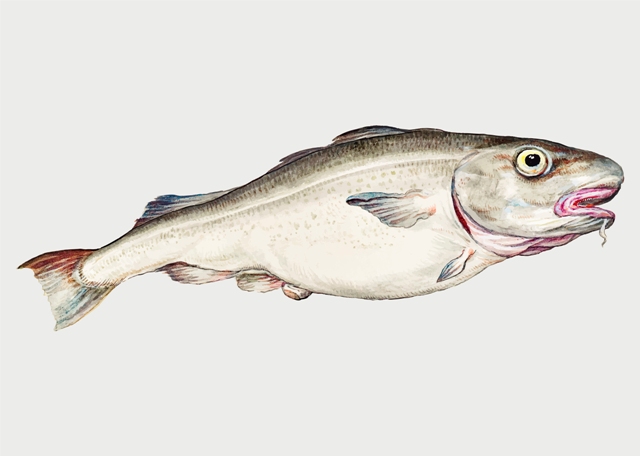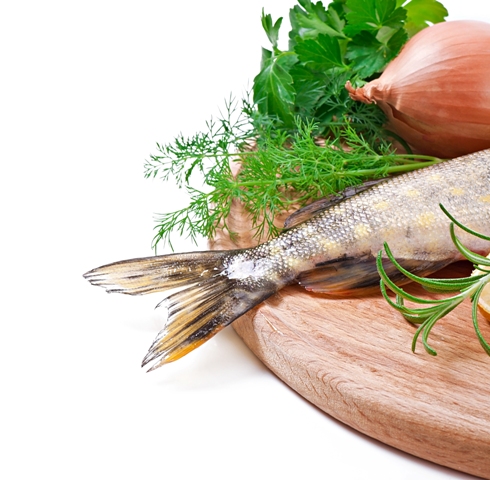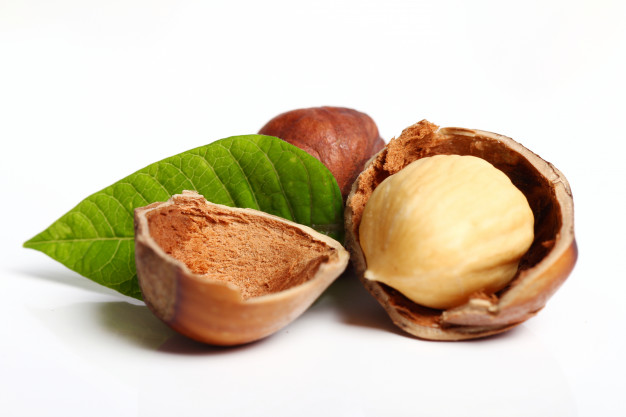Cod is a widely available variety of cold water fish. It is extremely rich in protein, omega-3 fatty acid as well as phosphorus and offers numerous health benefits.
Types of cod
Though various fishes are found in market that have taken on the name cod but there are four types of true cod available, which include –
- Pacific cod
- Atlantic cod
- Haddock
- Greenland Cod

Nutritional profile
- It contains negligible amount of carbohydrate thus it is considered as low glycemic food
- It is rich in protein and composed of several important amino acids
- It contains healthy fat as well. It contains both saturated and unsaturated fat but it is relatively higher in its unsaturated fatty acid contents. It is especially rich in omega 3 fatty acids
- It contains adequate amount of water too thus it is considered as a perishable food
- It contains several vitamins like Vitamin A, C, E, B3, B6, B9 and B12
- It is also loaded with various important trace elements, which include calcium, phosphorus, sodium, potassium, zinc, selenium, iron, copper, manganese and magnesium
Health benefits

Hypolipidemic activity
- It exerts potent hypolipidemic activity, which helps to decrease total fat percentages of body
- Omega-3 fatty acid content of cod plays vital role in decreasing the concentration of LDL, VLDL and triglyceride in body thus helps in protecting the body from the harmful consequences of hypercholesterolemia
- Niacin or Vitamin B3 component of cod is also responsible for decreasing blood cholesterol concentration
- Whereas it is related with increasing the level of HDL in body, which exhibits numerous positive impacts on health and helps to reduce the risk of developing cardiovascular disease, hepatic disorders, renal disorders and obesity
- Its consumption is also very effective for maintaining a healthy lipid profile as it helps to keep a healthy ratio of LDL and HDL in body
Role on cardio vascular health
- It is used as an important therapeutic substance for cardiac health
- It is packed with numerous cardio friendly nutrients that endorse cardiac functionality
- Its protein components help in promoting the health and activity of cardiac muscle
- As mentioned above its omega-3 fatty acid content is responsible for decreasing the level of bad cholesterol or LDL in body thus its consumption is thought to be very effective for inhibiting fat deposition within blood vessels. As a result it helps to prevent the narrowing of blood vessels by averting plaque formation, which significantly lessen the risk of developing atherosclerosis
- It is also associated with enhancing blood circulation
- Its antioxidant activity is responsible for protecting the heart from free radical induced oxidative damages, which ultimately help in decreasing the prevalence of cardio vascular diseases
- Its potassium content is accountable for preventing hypertension
- Its magnesium component helps in maintaining normal heart beat, which helps to prevent arrhythmia
- It is extremely useful for decreasing the prevalence of coronary artery disease, angina pectoris, myocardial infarction, strokes and heart attacks

Role on nervous system
- Individual who want to obtain a healthy nervous system should include cod in their diet as it contains various imperative nutrients that boost up the activity of both central and peripheral nervous system
- Its omega 3 fatty acid contents especially EPA and DHA components promote the functional development of brain
- Amino acid components of cod also help in the growth and development of brain
- B vitamins especially Vitamin B6 are considered as another imperative nutrients of cod that help in improving brain’s activity
- Its selenium and Vitamin E components are also accountable for improving brain health
- It is also associated with improving memory
- It helps to enhance cognitive ability as well
- It is related with protecting every nerve cells from oxidative damages as a result helps in promoting their activity and aids in the transmission of nerve impulses
- Whereas it helps to delay the progression of neuro-inflammatory events as well, which ultimately reduces the risk of developing neurological disorders and especially helps in improving the symptoms of Alzheimer’s disease


Role on muscle
- Proteins present in cod help in the growth and development of muscles as they act as building blocks of muscles
- Zinc and selenium components of cod are also related with improving muscular health
- It helps to improve lean muscle mass
- It is also associated with increasing muscular strength, which ultimately helps to make the muscle able to do strenuous work
- It aids in improving muscular performance as a result improves endurance
- It also helps to prevent muscular damages and promotes recovery
Role on skin
- It helps to make the skin healthy and supple
- Vitamin C present in cod helps in improving skin elasticity as it helps in stimulating collagen production
- Its Vitamin E component acts as free-radical scavenger that plays important role in protecting the skin from free radical induced oxidative damages and helps to reduce the prevalence of dermal disorders
- It helps to prevent ageing as well
Role on hair

- It contains various nutrients that provide proper nourishment to the scalp, which help in promoting hair growth
- Its consumption is very effective for increasing hair strength and shine
- It helps to prevent hair loss as well
Therapeutic uses
It has been traditionally used for various therapeutic purposes, which include –
- It is widely used as an important remedial action for preventing inflammation. It helps to prevent joint swelling as well thus its consumption is thought to be very much useful for improving the symptoms of arthritis and gout
- It is also associated with improving the symptoms of inflammatory bowel syndrome
- Its consumption is very much helpful for reducing the prevalence of asthma
- It is also very effective for preventing Pulmonary Embolism
- Being a low glycemic food it can be easily included in the diet of diabetic patients as it does not provide too much effect on postprandial blood sugar level
- Fatty acids present in cod play imperative role in improving mood by maintaining proper hormonal balance in body
- It helps to protect the body from deep vein thrombosis, which is responsible for developing swelling and pain
- Its consumption is very effective for reducing the prevalence of cancer especially colorectal cancer and Leukemia
- It plays significant role in boosting up the overall immunity of the body
- It contains significant amount of iodine thus its consumption is thought to be very effective for maintaining proper iodine level in body, which ultimately helps to decrease the prevalence of thyroid disorders
- Omega 3 fatty acid and Vitamin A present in cod helps in improving eye health and vision. It is also very effective for improving the symptoms of age related macular degeneration
- Its consumption is also associated with improving skeletal health

General consideration of using cod
- It is better to store it properly for enhancing its shelf life
- It can be stored in freezer for up to 6 months but if it is kept in refrigerator then it should be used within 2 days
Risk factors
- Its over consumption may increase the risk of developing mercury toxicity thus it is better to consume it in moderation
- As it contains adequate amount of sodium thus its over consumption may increase the risk of hypertension as well

Source:
Dale, H.F., Jensen, C., Hausken, T., Lied, E., Hatlebakk, J.G., Brønstad, I., Hoff, D.A.L. and Lied, G.A., 2018. Effect of a cod protein hydrolysate on postprandial glucose metabolism in healthy subjects: A double-blind cross-over trial. Journal of nutritional science, 7.
Kundam, D.N., Acham, I.O. and Girgih, A.T., 2018. Bioactive compounds in fish and their health benefits. Asian Food Science Journal, pp.1-14.
Mal, M., Kumar, A., Meraj, A., Devi, A., Mañego, A.M.B., Anjum, Z., Naz, S., Jamil, A., Fatima, A. and Kumar, B., 2021. Role of Cod Liver Oil in Preventing Myocardial Infarction. Cureus, 13(6).
Ricketts, P., Voutchkov, M. and Chan, H.M., 2020. Risk-benefit assessment for total mercury, arsenic, selenium, and omega-3 fatty acids exposure from fish consumption in Jamaica. Biological trace element research, 197(1), pp.262-270.
Sabarinathan, R., 2021. Fish oil for joint pain. in Health.
Tørris, C., Småstuen, M.C. and Molin, M., 2018. Nutrients in fish and possible associations with cardiovascular disease risk factors in metabolic syndrome. Nutrients, 10(7), p.952.









